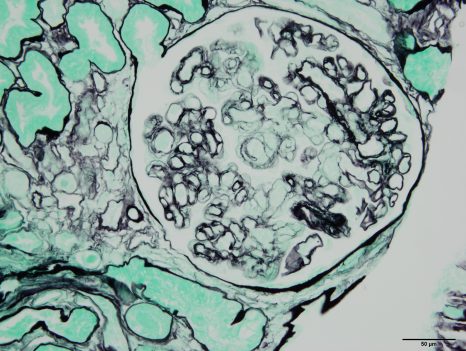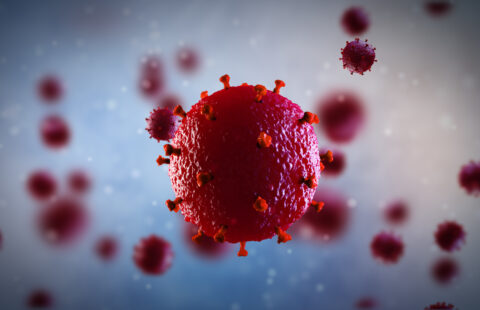The MHC class I MICA gene is a histocompatibility antigen in kidney transplantation
Raphael Carapito1,2,3,4,5, Ismail Aouadi1,2,3,5, Martin Verniquet1,2,3,5, Meiggie
Untrau1,2,3,5, Angélique Pichot1,2,3,5, Thomas Beaudrey1,2,5,6, Xavier Bassand1,2,5,6 Sébastien Meyer1,2,3,5, Loic Faucher2,7, Juliane Posson8, Aurore Morlon2,9, Irina Kotova2,9, Florent Delbos2,10, Alexandre Walencik2,10, Alice Aarnink11, Anne Kennel11,7 Caroline Suberbielle2,12, Jean-Luc Taupin2,12, Benedict M. Matern13, Eric Spierings13,8 Nicolas Congy-Jolivet2,14, Arnaud Essaydi15, Peggy Perrin1,2,5,6, Antoine Blancher2,14, Dominique Charron2,5,12, Nezih Cereb16, Myriam Maumy-Bertrand2,5,17, Frédéric Bertrand2,5,17, Valérie Garrigue2,18, Vincent Pernin2,18, Laurent Weekers19, Maarten Naesens20, Nassim Kamar2,21, Christophe Legendre2,22, Denis Glotz2,8, Sophie Caillard1,2,5,6, Marc Ladrière23, Magali Giral2,7, Dany Anglicheau2,22,24, Caner13 Süsal25,26, Seiamak Bahram1,2,3,4,5
1 Laboratoire d’ImmunoRhumatologie Moléculaire, Institut national de la santé et de
la recherche médicale (Inserm) UMR_S1109, Plateforme GENOMAX, Faculté de26
Médecine, Fédération Hospitalo-Universitaire OMICARE, Centre de Recherche
d’Immunologie et d’Hématologie, Centre de Recherche en Biomédecine de
Strasbourg (CRBS), Fédération de Médecine Translationnelle de Strasbourg (FMTS),
Université de Strasbourg, Strasbourg, France.
2 Laboratoire d’Excellence (LabEx) TRANSPLANTEX, Faculté de Médecine
Université de Strasbourg, Strasbourg, France.
3 Institut national de la santé et de la recherche médicale (INSERM) Franco
(Strasbourg)-Japanese (Nagano) Nextgen HLA laboratory, Strasbourg, France.
4 Laboratoire d’Immunologie, Plateau Technique de Biologie, Pôle de Biologie
Nouvel Hôpital Civil, Strasbourg, France.
5 Institut Thématique Interdisciplinaire (ITI) de Médecine de Précision de Strasbourg
Strasbourg, France.
6 Nephrology-Transplantation Department, University Hospital, Strasbourg, France.
7 CHU Nantes, Université de Nantes, INSERM, Centre de Recherche en
Transplantation et Immunologie, UMR 1064, ITUN, F-44000 Nantes, France.
8 Paris Translational Research Center for Organ Transplantation, Institut national de
la santé et de la recherche médicale (INSERM), UMR_S 970, Paris, France. Kidney
Transplant Department, Saint-Louis Hospital, Assistance Publique – Hôpitaux de
Paris, Paris, France.
9 BIOMICA SAS, Strasbourg, France.
10 Etablissement Français du Sang (EFS) Centre Pays de la Loire, Laboratoire HLA
Nantes, France.
11 Laboratory of Histocompatibility, Centre Hospitalier Régional Universitaire, Nancy,
France.
12 Laboratoire Jean Dausset, Laboratoire d’immunologie et d’histocompatibilité
Institut national de la santé et de la recherche médicale (Inserm) UMR_S 976
Human Immunology, Pathophysiology, Immunotherapy (HIPI), Institut de Recherche
Saint-Louis Université de Paris, Hôpital Saint-Louis, Paris, France.
13 Center of Translational Immunology, HLA and Tissue Typing, University Medical
Center Utrecht, Utrecht, The Netherlands.
14 Laboratoire d’immunogénétique moléculaire (LIMT, EA 3034), Faculté de
médecine Purpan, Université Toulouse 3 (Université Paul Sabatier, UPS), Toulouse
France. Laboratoire d’immunologie, Centre Hospitalier Universitaire de Toulouse,
France.
15 Etablissement Français du Sang (EFS) Grand-Est, Laboratoire HLA, Strasbourg
France.
16 Histogenetics, 300 Executive Blvd, Ossining, NY 10562.
17 Institut de Recherche Mathématique Avancée (IRMA), Centre national de la
recherche scientifique (CNRS) UMR 7501, Laboratoire d’Excellence (LabEx) Institut
de Recherche en Mathématiques, Interactions et Applications (IRMIA), Université de
Strasbourg, 67084, Strasbourg, France.
18 Service de Néphrologie-Transplantation-Dialyse péritonéale, Centre Hospitalier
Universitaire Lapeyronie, Montpellier, France.
19 Division of Nephrology, University of Liege Hospital (ULiege CHU), Liege,
Belgium.
20 Department of Microbiology, Immunology and Transplantation, KU Leuven, Belgium
21 Departments of Nephrology and Organ Transplantation, Centre Hospitalier
Universitaire de Rangueil, INSERM UMR1291 – CNRS UMR5051 – Université
Toulouse III, Toulouse Institute for Infectious and Inflammatory Diseases (Infinity)
Toulouse, Université Toulouse III Paul Sabatier, Toulouse, F-31300 France.
22 Service de Transplantation Rénale Adulte, Hôpital Necker, Assistance Publique
Hôpitaux de Paris, Université de Paris, Paris, France.
23 Department of Renal Transplantation, Centre Hospitalier Régional Universitaire
Nancy, France.
24 Institut national de la santé et de la recherche médicale (INSERM), UMR_S 1151
Paris, France.
25 Institute of Immunology, Heidelberg University Hospital, Heidelberg, Germany
26 Transplant Immunology Research Center of Excellence, Koç University, Istanbul
Turkey.
Nature Medicine, mars 2022
DOI : https://www.nature.com/articles/s41591-022-01725-2
The MHC class I MICA gene is a histocompatibility antigen in kidney transplantation
Raphael Carapito1,2,3,4,5, Ismail Aouadi1,2,3,5, Martin Verniquet1,2,3,5, Meiggie
Untrau1,2,3,5, Angélique Pichot1,2,3,5, Thomas Beaudrey1,2,5,6, Xavier Bassand1,2,5,6 Sébastien Meyer1,2,3,5, Loic Faucher2,7, Juliane Posson8, Aurore Morlon2,9, Irina Kotova2,9, Florent Delbos2,10, Alexandre Walencik2,10, Alice Aarnink11, Anne Kennel11,7 Caroline Suberbielle2,12, Jean-Luc Taupin2,12, Benedict M. Matern13, Eric Spierings13,8 Nicolas Congy-Jolivet2,14, Arnaud Essaydi15, Peggy Perrin1,2,5,6, Antoine Blancher2,14, Dominique Charron2,5,12, Nezih Cereb16, Myriam Maumy-Bertrand2,5,17, Frédéric Bertrand2,5,17, Valérie Garrigue2,18, Vincent Pernin2,18, Laurent Weekers19, Maarten Naesens20, Nassim Kamar2,21, Christophe Legendre2,22, Denis Glotz2,8, Sophie Caillard1,2,5,6, Marc Ladrière23, Magali Giral2,7, Dany Anglicheau2,22,24, Caner13 Süsal25,26, Seiamak Bahram1,2,3,4,5
1 Laboratoire d’ImmunoRhumatologie Moléculaire, Institut national de la santé et de
la recherche médicale (Inserm) UMR_S1109, Plateforme GENOMAX, Faculté de26
Médecine, Fédération Hospitalo-Universitaire OMICARE, Centre de Recherche
d’Immunologie et d’Hématologie, Centre de Recherche en Biomédecine de
Strasbourg (CRBS), Fédération de Médecine Translationnelle de Strasbourg (FMTS),
Université de Strasbourg, Strasbourg, France.
2 Laboratoire d’Excellence (LabEx) TRANSPLANTEX, Faculté de Médecine
Université de Strasbourg, Strasbourg, France.
3 Institut national de la santé et de la recherche médicale (INSERM) Franco
(Strasbourg)-Japanese (Nagano) Nextgen HLA laboratory, Strasbourg, France.
4 Laboratoire d’Immunologie, Plateau Technique de Biologie, Pôle de Biologie
Nouvel Hôpital Civil, Strasbourg, France.
5 Institut Thématique Interdisciplinaire (ITI) de Médecine de Précision de Strasbourg
Strasbourg, France.
6 Nephrology-Transplantation Department, University Hospital, Strasbourg, France.
7 CHU Nantes, Université de Nantes, INSERM, Centre de Recherche en
Transplantation et Immunologie, UMR 1064, ITUN, F-44000 Nantes, France.
8 Paris Translational Research Center for Organ Transplantation, Institut national de
la santé et de la recherche médicale (INSERM), UMR_S 970, Paris, France. Kidney
Transplant Department, Saint-Louis Hospital, Assistance Publique – Hôpitaux de
Paris, Paris, France.
9 BIOMICA SAS, Strasbourg, France.
10 Etablissement Français du Sang (EFS) Centre Pays de la Loire, Laboratoire HLA
Nantes, France.
11 Laboratory of Histocompatibility, Centre Hospitalier Régional Universitaire, Nancy,
France.
12 Laboratoire Jean Dausset, Laboratoire d’immunologie et d’histocompatibilité
Institut national de la santé et de la recherche médicale (Inserm) UMR_S 976
Human Immunology, Pathophysiology, Immunotherapy (HIPI), Institut de Recherche
Saint-Louis Université de Paris, Hôpital Saint-Louis, Paris, France.
13 Center of Translational Immunology, HLA and Tissue Typing, University Medical
Center Utrecht, Utrecht, The Netherlands.
14 Laboratoire d’immunogénétique moléculaire (LIMT, EA 3034), Faculté de
médecine Purpan, Université Toulouse 3 (Université Paul Sabatier, UPS), Toulouse
France. Laboratoire d’immunologie, Centre Hospitalier Universitaire de Toulouse,
France.
15 Etablissement Français du Sang (EFS) Grand-Est, Laboratoire HLA, Strasbourg
France.
16 Histogenetics, 300 Executive Blvd, Ossining, NY 10562.
17 Institut de Recherche Mathématique Avancée (IRMA), Centre national de la
recherche scientifique (CNRS) UMR 7501, Laboratoire d’Excellence (LabEx) Institut
de Recherche en Mathématiques, Interactions et Applications (IRMIA), Université de
Strasbourg, 67084, Strasbourg, France.
18 Service de Néphrologie-Transplantation-Dialyse péritonéale, Centre Hospitalier
Universitaire Lapeyronie, Montpellier, France.
19 Division of Nephrology, University of Liege Hospital (ULiege CHU), Liege,
Belgium.
20 Department of Microbiology, Immunology and Transplantation, KU Leuven, Belgium
21 Departments of Nephrology and Organ Transplantation, Centre Hospitalier
Universitaire de Rangueil, INSERM UMR1291 – CNRS UMR5051 – Université
Toulouse III, Toulouse Institute for Infectious and Inflammatory Diseases (Infinity)
Toulouse, Université Toulouse III Paul Sabatier, Toulouse, F-31300 France.
22 Service de Transplantation Rénale Adulte, Hôpital Necker, Assistance Publique
Hôpitaux de Paris, Université de Paris, Paris, France.
23 Department of Renal Transplantation, Centre Hospitalier Régional Universitaire
Nancy, France.
24 Institut national de la santé et de la recherche médicale (INSERM), UMR_S 1151
Paris, France.
25 Institute of Immunology, Heidelberg University Hospital, Heidelberg, Germany
26 Transplant Immunology Research Center of Excellence, Koç University, Istanbul
Turkey.
Nature Medicine, mars 2022
DOI : https://www.nature.com/articles/s41591-022-01725-2


